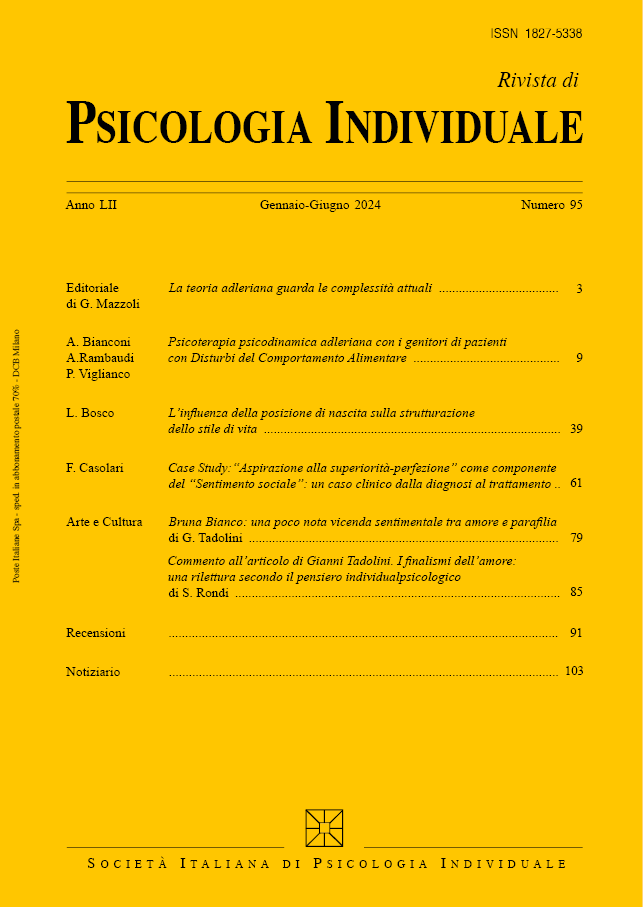
Code of Ethics
Background and Scope
The Journal of Individual Psychology aims to offer to S.I.P.I. Members, Psychologists and Physicians interested in Individual Psychology, and scholars of the subject a space for sharing the outcomes of research oriented to deepen the psychic dynamisms in the light of the theoretical principles of Individual Psychology.
Theaims of the Journal are inspired by the principle of sharing and dissemination of the culture of quality and co-responsibility. The model encourages debate on the evolution of theoretical guidelines in relation to continuous and rapid social transformations. The Review advocates creative discussion among experts, scholars, practitioners, communities and networks that recognize the person at the center of every psychic and relational process.
The Journal of Individual Psychology aims to propose research works of high scientific profile by selecting works that are the result of well-documented insights, oriented to intra-theoretical reflections as well as comparisons between different theoretical-clinical positions.
The adoption of a formalCode of Ethics that sets out guidelines to safeguard scientific standards and indicate ethically sound behavior to Editors, Authors and Referees can build to maintain trust in the Journal and enhance its reputation.
All persons involved in managing the construction of each issue of the Journal are encouraged to consider this Code of Ethics carefully and to address any questions or concerns to the Editor or Editor-in-Chief of the Journal.
Responsibilities of the Editor.
The Editor, Editor-in-Chief, and Editorial Board are committed to ensuring that each proposed article is evaluated in an impartial manner. Each Author must be assured of accurate and explicitly reasoned scientific judgment
The Editor-in-Chief must maintain its editorial independence and ensure the fairness of the procedures for evaluating, accepting, or rejecting contributions proposed by Authors.
The Editor, in consultation with the entire Editorial Board and after consultation with the Referees, has full responsibility for accepting or rejecting a submitted work. However, manuscripts deemed clearly inappropriatemay be rejected, with appropriate justification, without proceeding to revision work
Articles submitted for publication must be evaluated on the basis of scientific content without discrimination on the basis of race, gender, sexual orientation, religion, ethnicity, nationality, or political views of the Authors
The Journal follows a double-blind review process, in which the Authors do not know the Referees and vice versa. In addition, the editorial team is required to ensure the confidentiality of the double-blind review process and not to disclose any information that would identify Authors and Referees or vice versa.
Two Referees are invited to evaluate a manuscript. In complex cases, The Editor-in-Chief and Editor-in-Chief may decide to invite an additional Referee or external expert to provide additional evaluation.
Since receipt of a manuscript, the utmost discretion should be observed and no information about the manuscript should be revealed to anyone other than the Referees, and members of the Editorial Board. In any case, the identity of the Authors will not be revealed until the evaluation is completed
The Editor-in-Chief and the Editorial Board ensure that the contents of a manuscript submitted for publication cannot be used without the express permission of the Author, even in the absence of publication . Information or ideas obtained from the work of the referees are strictly confidential
Responsibilities of the referees
The double-blind review process adopted by the Journal entails absolute confidentiality: if a Referee has knowledge of the identity of the Author(s), he or she must inform the Editor-in-Chief and Editor-in-Chief and discuss with them whether this knowledge might be grounds for refusal of the review. Referees are also responsible for avoiding writing, doing, or saying anything that might allow them to be identified by the Author
A Referee who does not feel adequate to judge a manuscript, because the content does not pertain to his or her subject of specialization, or who is unable to finish the evaluation of the proposed manuscript within the allotted time, is required to promptly notify theReferee and ask to be replaced.
The Referee must evaluate manuscripts objectively, fairly and professionally and respect the scientific and intellectual independence of theAuthor. The Referee must avoid personal bias in the evaluation process
The Referee must respect the confidentiality of the review process; he/she must not discuss the manuscript with anyone or share any information with others. In addition, privileged information or ideas obtained by the Referee through the review should not be used for personal gain
In evaluating the manuscript and making comments to the Authors, the Referee must adequately explain and support his or her academic judgments, providing the Authors with sufficient details to justify his or her recommendations.
The Referee must be familiar with and follow the Journal's guidelines for reviewers when completing the evaluation work for the Journal
Endnotes.
The Editor-in-Chief, Editorial Board, Referees, and Authors should take note of and promote this Code of Ethics. Lack of awareness or misunderstanding of an ethical standard is not a defense against an accusation of unethical conduct.
The Editor is responsible for the interpretation, application, and enforcement of the Code of Ethics.
Any Author or Referee who sees a violation of this Code of Ethics may send a complaint to the Editor-in-Chief of the Journal.




